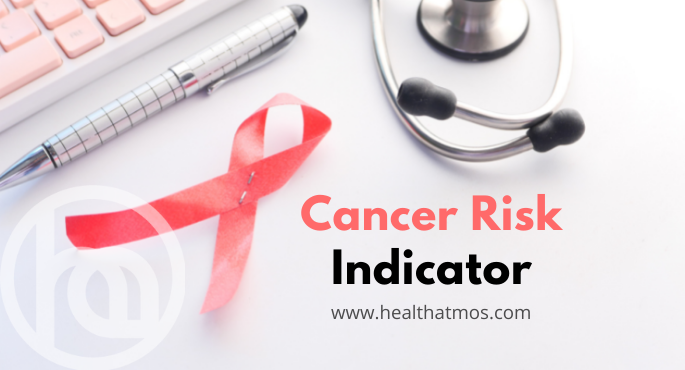Cancer Risk Indicator

Cancer Risk:
The cancer cell replicates itself, producing millions of similarly affected self-replicating cells which may spread to other parts of the body and eventually overwhelm it. However, cancer can be treated successfully and is curable. Some people who have been treated for cancer have lived long, healthy lives, with no sign or symptom of the disease.
What are the Warning Signals of Cancer?
On the first evidence of any of the symptoms below, a doctor should be consulted. The symptoms may not be indicative of cancer but the sooner you find out, the better. Some of the warning signals of cancer are as follows:
- A change in bowel or bladder patterns or habits.
- A sore that does not heal.
- Unusual bleeding or discharge.
- Thickening or lump in breast or elsewhere.
- Regular indigestion or difficulty in swallowing.
- Obvious change in a wart or mole.
- Constant nagging cough or hoarseness.
- Recent unexplained weight loss.
What are Some Cancer Screening Tests?
- Early detection of tumors can be done by means of mammography, thermograms, sonograms (ultra sound pictures), CAT scans, Pap smears, and excreta tests.
- MRI scan is a radiation-free and painless procedure. It is so effective that brain tumors were found in 93 patients for which CAT scans had found no brain abnormalities.
What are the definitions of Cancer Terminology?
- Tumor– An abnormal mass of tissue or unhealthy swelling is called a new growth. It can be benign or malignant.
- Benign– Cells that do not invade other tissue. However, a benign tumor can cause dangerous pressure.
- Malignant– Cells that invade surrounding tissues and eventually overwhelm the patient.
- Cancer– A malignant tumor. Cancers are listed under two main groups which are sarcomas and carcinomas.
- Sarcomas– cancers of the structural and connective tissues, including bones, cartilage, fat, and muscle.
- Carcinomas– Cancers that affect the tissues and body organs such as the skin, intestines, lungs, and breasts.
- Carcinogen– a cancer causing substance.
- Metastasis– transmission of a disease from its original source to other areas in the body.
- Lymph– a clear fluid circulating through the body. It contains white blood cells, antibodies, impurities, and nourishing substances.
- Lymph glands or nodes– These normally filter impurities from the body. The lymph system is vital in the body’s defence against infection.
The definition for three major treatments for cancer which are surgery, chemotherapy and radiation.
- Surgery involves the surgical removal of the tumor and surrounding tissues.
- Chemotherapy is the treatment for cancer with drugs which attacks the tumor cells in the body. Over fifty chemicals are used in chemotherapy (chemical therapy) and some tumors have been cured.
- Radiation therapy is the use of high-energy radiation to destroy the malignant cells.
What are the Causes of Cancer?
There are different types of cancer with interrelated causes. For instance, excessive stress can affect the immune system and makes a person prone to cancer.
- Our daily habits of what we eat and drink, whether we smoke and how often we expose ourselves to the sun, determines our risk of getting many cancers.
- People whose diets are low in vitamin A have been linked to cancers of prostate gland, cervix, skin, bladder and colon.
- Chemicals used in food, as well as industrial pollutants, have been pinpointed as possible causes. For example, delay in having a first child, thus delaying natural lactation, also has some bearing on breast cancer.
What could trigger cancer?
- The high rates of colon and breast cancer are caused due to diet. Diet also includes the liquid intake. Since alcohol abuse can lead to various cancers, the obvious counsel is to drink in moderation i.e. two or fewer drinks a day, especially if you smoke.
- Some chemicals like alkylating agents, aromatic amines, asbestos, benzene, vinyl chloride, and certain compounds or oxidation states of arsenic, cadmium, chromium, and nickel can trigger a cancer reaction.
- Risky occupations like hardwood-furniture and leather-goods manufacture, as well as the production of isopropyl alcohol.
- Consuming too much of saturated fat and unsaturated fat would increase your chances of getting cancers of colon, breast, prostate, and endometrium [lining of the uterus].
What are Some helpful Preventative Measures for Cancer?
- You should intake plenty of fruits, vegetables, peas, beans, and cereals. People who eat vegetables daily have a lower risk of cancer than those who don’t. For instance, cabbages reduce risk of colon cancer. You should also intake foods such as potatoes, apples, pears, and peaches with their skins.
- Poultry and fish are recommended instead of red meat. In case you choose meat you should make sure that it has less fat on it.
- Choose low-fat or skim-milk dairy products. You should include foods that contain vitamins A and C, such as the dark green leafy vegetables, broccoli, kale, spinach, chicory, watercress, beets, and even dandelion greens.
- 25-35 grams (about one ounce) of natural fiber a day helps to keep the intestines naturally cleaned.
- Vegetables like carrots, sweet potatoes, pumpkins, squash and fruits like apricots, cantaloupes, papayas, peaches, pineapples, and melons, to name just a few.
- Avoiding smoking would also reduce the frequency of other cancers.
- The average snuff users have four times the risk of mouth cancer than a nonuser, and long-time snuff users have 50 times the risk. This also involves dipping snuff which means putting finely cut tobacco inside one’s mouth under the lip or between the cheek and gum.
- Every year a woman breast-feeds she cuts her lifetime risk of developing breast cancer by 4.3 percent.
- Blood transfusions lower the body’s immune system which allows cancer to spread more easily.
What are the Side Effects of Cancer Treatments?
It would not be fair to speak about success in cancer treatment without mentioning the side effects.
- Chemotherapy drugs are toxins [poisons] and some of these drugs are so toxic that patients die of their side effects.
- A chemotherapy drug kills more malignant cells than healthy ones. But other side effects are nausea, vomiting, and temporary loss of hair.
- Radiation therapy is really a burning process that destroys all the cells it touches and it can be focused on the exact area of the tumor. However, in radiation therapy the cancer could recur.
You can read more articles on health by following our blog. You can also book your health check-up by contacting Health Atmos. We cover all states in India and 25+ countries globally. You can choose a home collection service or walk-in appointment at a lab near you. We will be happy to be at your service. Stay Healthy! Stay Safe!
